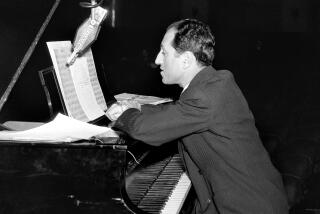Thoughtful Takes on Gershwin
- Share via
Although this richly textured set of pieces from pianist Herbie Hancock was clearly aimed at tying in with the centennial of George Gershwin’s birth (which was actually in September), it reaches beyond the Gershwin music itself. And thus the title, which reflects the recording’s effort to encompass Gershwin’s work as well as the music of such contemporaries as James P. Johnson, W.C. Handy, Maurice Ravel and Duke Ellington.
Verve has further signaled a belief in the importance of the project by providing a production that includes contributions from, among others, Stevie Wonder, Joni Mitchell, Chick Corea, Wayne Shorter and James Carter. “Our intentions,” Hancock notes on the album, “were to reach inside to the core of each piece in search of the composer’s original impulses, and to take those elements and recompose and reconstruct them in our own way.”
Obviously an ambitious goal, but one that, in part, is essentially what jazz players attempt to do every time they rework a standard tune. The other part, Hancock’s unusual assertion of an intention to “recompose,” implies the sort of drastic revisionism that, thankfully, doesn’t really take place in the album.
What appears instead is a sequence of unusually thoughtful takes on Gershwin (and the others)--the most unexpected of which are Mitchell’s renderings of “The Man I Love” and “Summertime.” Although her “Mingus”-era forays into jazz aroused understandable skepticism in the jazz community, she phrases here with authority and understanding. Although the perspective she brings to the music does not flow--as it does for most jazz singers--from blues and gospel sources, it nonetheless offers a compelling view of music that is usually heard in a far different style.
Wonder surfaces in a rock-tinged romp through “St. Louis Blues” that also features a rare example of Hancock’s organ playing, and interjections (via overdubbing) from Wonder’s harmonica playing and scat singing. And several tracks include Miles Davis-like renderings, with the muted trumpet of Eddie Henderson.
Finally, there are three extended pieces that range from an 11-minute orchestral version of the relatively obscure, early Gershwin piece “Lullaby,” and an interpretation of his Prelude No. 2 featuring the soprano voice of Kathleen Battle, to Hancock’s take on the second movement of Ravel’s jazz-tinged Concerto for Piano and Orchestra in G.
It is a tribute to Hancock’s versatility that he not only functions effectively in all these settings, but also manages to put the stamp of his own personality on every piece, most notably on a tender, solo view of “Embraceable You.” But his understandable desire to encompass so much of Gershwin, and then toss in the music of Gershwin’s contemporaries as well, has the contradictory effect of producing an album that lacks a focused center. As fascinating as the individual segments are, they don’t quite add up to a complete perspective on either Gershwin or Hancock.
*
Albums are rated on a scale of one star (poor) to four stars (excellent).
More to Read
The biggest entertainment stories
Get our big stories about Hollywood, film, television, music, arts, culture and more right in your inbox as soon as they publish.
You may occasionally receive promotional content from the Los Angeles Times.









